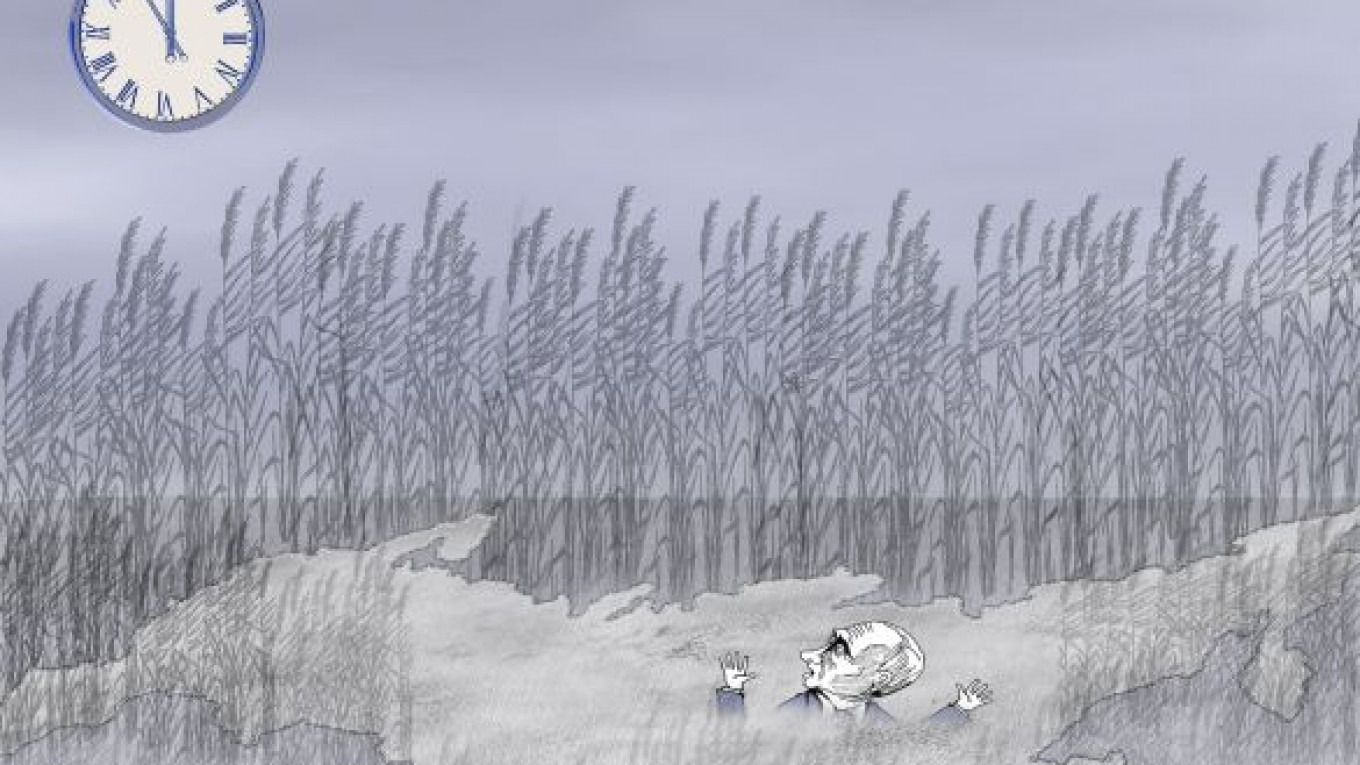On Monday, Vladimir Putin will take the presidential oath of office for the third time. After 12 years in power, Putin has increased his control over the country's major institutions, the siloviki and state bureaucracy. He still has widespread popular support, but this is steadily declining, as evidenced by his showing in the recent presidential election. In any case, Putin will start his third presidential term under radically different circumstances than even eight months ago.
In the coming months, Putin can expect to face ever-increasing opposition from civil society as an increasing number of people reject his authoritarian model of government and demand more democracy and rule of law. This growing civil society is being driven by a powerful middle class. Only several years ago, most members of this class were politically passive and focused on consumerism. But this radically changed on Sept. 24 when Putin announced at the United Russia convention that he would switch places with President Dmitry Medvedev. A European-type middle class now constitutes one-third of Russia's adult population and almost 50 percent of the population in major cities, according to Mikhail Dmitriyev, an economist from the Center for Strategic Studies. What's more, the middle class will grow steadily in the coming years. Its members demand fair elections, true political pluralism and systemic political reforms. This was clearly demonstrated during the mass protests in December and February.
Since September, the angry middle class has also learned how to form a powerful movement. It has contributed money to fund protest rallies and to help victims of law enforcement abuse. New nongovernmental organizations have been formed, and tens of thousands of volunteers who monitored the recent elections disclosed evidence of electoral fraud on the Internet, which has played a critical role in mobilizing the anti-Putin movement.
There are five main areas that will ultimately prove the undoing of Putin's autocracy in the next six years:
1. Electoral fraud and manipulation. Even though the State Duma and presidential elections are over, the confrontation between society and the authorities has by no means ended. As the popularity of Putin and the party of power decreases, the Kremlin will have no other choice in mayoral, regional and federal elections but to resort to election fraud and other manipulations. The type of protests we saw in Astrakhan last month, which were driven by allegations of vote-rigging in the city's March mayoral race, will surely be repeated in dozens of other cities if electoral fraud continues.
2. Corruption. The Kremlin is planning to create even more nontransparent state corporations, while Russian society is growing increasingly intolerant of the plundering of budgetary funds, the excessive privileges given to state officials and the merging of the state and business. The number of grassroots anti-corruption initiatives like RosPil, created by opposition leader Alexei Navalny, will likely increase and put more pressure on authorities to investigate and prosecute top officials on corruption charges. If the Prosecutor General's Office continues to protect members of Putin's inner circle, this will only fuel more anger among the people against the country's deeply entrenched kleptocracy.
3. Judicial and police abuse. Society is becoming increasingly intolerant of police misconduct and biased court rulings. Civic initiatives to protect the rights of those who have been wrongfully held in pretrial detention and convicted, such as the group that journalist Olga Romanova formed, will also continue to mobilize more people against the Putin regime.
4. Censorship and propaganda in the state-controlled media. People are becoming increasingly impatient with the lies and propaganda on
Kremlin-censored state television stations.
Opposition-minded Internet resources are multiplying, including online television stations such as SOTV and Dozhd TV. In the future, as Internet usage continues to increase among Russians, this is bound to have a negative impact on the Kremlin's near monopoly on television.
5. Destruction of historical sites. Russia is now home to a predatory form of capitalism designed to benefit those in power and that steamrolls over anything standing in the way of huge profits for government officials and influential businesspeople. An increasing number of public parks and squares, rivers and lakes, historical buildings and estates, nature reserves and national parks are all falling victim to inside, corrupt development deals. As happened at the end of the Soviet era, civil society is again focusing on protecting nature and the country's historical heritage. New citizen groups have formed to protect national treasures such as Lake Baikal, the Ukok Plateau amid the Altai mountains and the historic buildings in St. Petersburg and Moscow.
The only way Putin knows how to govern is by falsifying and manipulating elections, buying the loyalty of corrupt officials, keeping the courts obedient and controlling the main media outlets. But that is the very model of government that a growing and powerful civil society finds completely unacceptable. The future belongs to them.
Vladimir Ryzhkov, a State Duma deputy from 1993 to 2007, hosts a political talk show on Ekho Moskvy radio and is a co-founder of the opposition Party of People's Freedom.
A Message from The Moscow Times:
Dear readers,
We are facing unprecedented challenges. Russia's Prosecutor General's Office has designated The Moscow Times as an "undesirable" organization, criminalizing our work and putting our staff at risk of prosecution. This follows our earlier unjust labeling as a "foreign agent."
These actions are direct attempts to silence independent journalism in Russia. The authorities claim our work "discredits the decisions of the Russian leadership." We see things differently: we strive to provide accurate, unbiased reporting on Russia.
We, the journalists of The Moscow Times, refuse to be silenced. But to continue our work, we need your help.
Your support, no matter how small, makes a world of difference. If you can, please support us monthly starting from just $2. It's quick to set up, and every contribution makes a significant impact.
By supporting The Moscow Times, you're defending open, independent journalism in the face of repression. Thank you for standing with us.
Remind me later.








